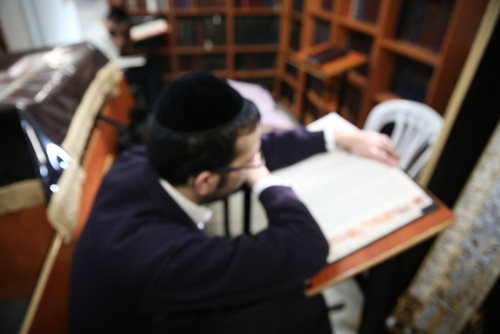Ask the Rabbi with Rabbi Chaim Mintz
Many people have the custom to sing Mizmor L’David – Chapter 23 of Tehillim – three times at the third Shabbat meal. What is the reason for this, and if it’s not done in my shul should I insist they start?
Rabbi Chaim Mintz responds:
Shabbat – The Source of All Blessing
In Psalm 23, beginning with the words “Mizmor L’David,” David Hamelech (King David) describes his feelings of inner peace and tranquility. He proclaims that he is not scared even when entering the “valley of death,” comforted with the knowledge that Hashem (God) is with him at all times, and prays that he be pursued only by Hashem’s kindness. Since Shabbat is a day of menuchah (rest and serenity) – and a day of great blessing, it is certainly fitting to sing these words as Shabbat ends. We seek to internalize this feeling, and pray that these blessings accompany us throughout the week.
As we say in Lechah Dodi (the prayer welcoming Shabbat), Shabbat is the mekor habracha – the source of all blessings. This means that all the good we receive throughout the week – whether spiritual or physical – is rooted in the blessings of Shabbat. On Shabbat, we take a break from our work and focus on recognizing that Hashem created the world and continues to sustain it every second. This helps us realize that success and achievement is not ours, but from Hashem, making us more worthy of His blessing. The more we honor Shabbat, the more blessings we will enjoy during the workweek to come.
The Solution to Our Troubles
Indeed, we sometimes encounter troubles during the week, be it spiritual or physical, and wonder what we did wrong to deserve this difficulty. Yet it may actually be due to a deficiency at the source – our Shabbat observance. By improving the way we observe Shabbat, we can tap into this wellspring of blessing, enabling us to be more successful in all our endeavors throughout the week. This can be accomplished through increased Torah study; putting greater effort into the prayers; or with more words of Torah and inspiration, as well as zemirot and serving special delicacies at the Shabbat table.
Singing Mizmor L’David Helps Internalize Shabbat
As we sit at the third and final meal of Shabbat, and bid farewell to this wonderful day, we try to internalize the lessons of Shabbat and take them along with us. Knowing that we are about to return to the dark and scary world, we sing David Hamelech’s message of calm and tranquility, Mizmor L’David, reassuring ourselves that Hashem is our “Shepherd,” and will lead us and shower us with His kindness.
Three Times – An Establishment of Permanence
Singing it three times emphasizes the importance of this message, like other prayers that are recited three times. Something done three times creates a chazakah – a halachic method of establishing the permanence of something. As Shlomo Hamelech (King Solomon) teaches (Kohelet 4:12), “A three-fold thread is not easily severed.” Although this is a wonderful custom, it is certainly not worth fighting over. Dispute and discord would have the opposite effect, as lack of unity weakens our connection to Hashem, and can cause us to lose any blessings we wish to receive. If the people in your shul are opposed to it, just leave things as is. Singing Mizmor L’David once with meaning is also beneficial, and if you want, you can sing it to yourself two more times.
In short: As we sit at the final meal of Shabbat, we internalize David Hamelech’s message of calm and tranquility, and try to carry it with us throughout the week. Three times emphasizes the message. Don’t fight about it, as that can cause you to lose any blessings you wish to receive.
You can ask Rabbi Mintz your own question at asktherabbi@oorah.org, or head to oorah.org/asktherabbi/ to watch the latest Q&As or join Ask the Rabbi Live, Tuesdays at 9PM ET.


